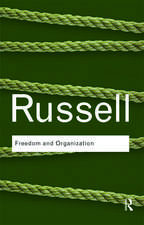Was the Industrial Revolution Necessary?
Editat de Graeme Snooksen Limba Engleză Paperback – sep 1994
| Toate formatele și edițiile | Preț | Express |
|---|---|---|
| Paperback (1) | 418.97 lei 6-8 săpt. | |
| Taylor & Francis – sep 1994 | 418.97 lei 6-8 săpt. | |
| Hardback (1) | 1377.53 lei 6-8 săpt. | |
| Taylor & Francis – sep 1994 | 1377.53 lei 6-8 săpt. |
Preț: 418.97 lei
Preț vechi: 492.91 lei
-15% Nou
Puncte Express: 628
Preț estimativ în valută:
80.18€ • 87.06$ • 67.35£
80.18€ • 87.06$ • 67.35£
Carte tipărită la comandă
Livrare economică 22 aprilie-06 mai
Preluare comenzi: 021 569.72.76
Specificații
ISBN-13: 9780415108690
ISBN-10: 0415108691
Pagini: 176
Dimensiuni: 138 x 216 x 14 mm
Greutate: 0.23 kg
Ediția:New.
Editura: Taylor & Francis
Colecția Routledge
Locul publicării:Oxford, United Kingdom
ISBN-10: 0415108691
Pagini: 176
Dimensiuni: 138 x 216 x 14 mm
Greutate: 0.23 kg
Ediția:New.
Editura: Taylor & Francis
Colecția Routledge
Locul publicării:Oxford, United Kingdom
Cuprins
List of Contents List of Tables List of Figures Preface 1. New Perspectives on the Industrial Revolution Graeme Donald Snooks 2. The Classical Economists, the Stationary State, and the Industrial Revolution E.A. Wrigley 3. Great Waves of Economic Change: the Industrial Revolution in Historical Perspective 1000 to 2000 Graeme Donald Snooks 4. What Was the Rate of Economic Growth During the Industrial Revolution R.V. Jackson 5. The Industrial Revolution and the Genesis of the Male Breadwinner Stephen Nicholas and Deborah Oxley 6. The Industrial Revolution Revisited Stanley L. Engerman Notes Select Bibliography Index
Notă biografică
Graeme Donald Snooks is Coghlan Professor of Economic History at the Institute of Advanced Studies, Australian National University. He has published widely on a number of central issues in economic history and is editor of a number of prestigious book series and journals.
Descriere
This book looks at this much studied subject but asks new questions, explores new issues and uses new data in order to stimulate interest and elicit new responses.















